Roma, chapel of the General Directorate, October 9, 2009: The Apostolic Visitor Mons. Giuseppe Versaldi with the Legionaries of Christ community during an Eucharistic Adoration.
Intervention of the Holy See
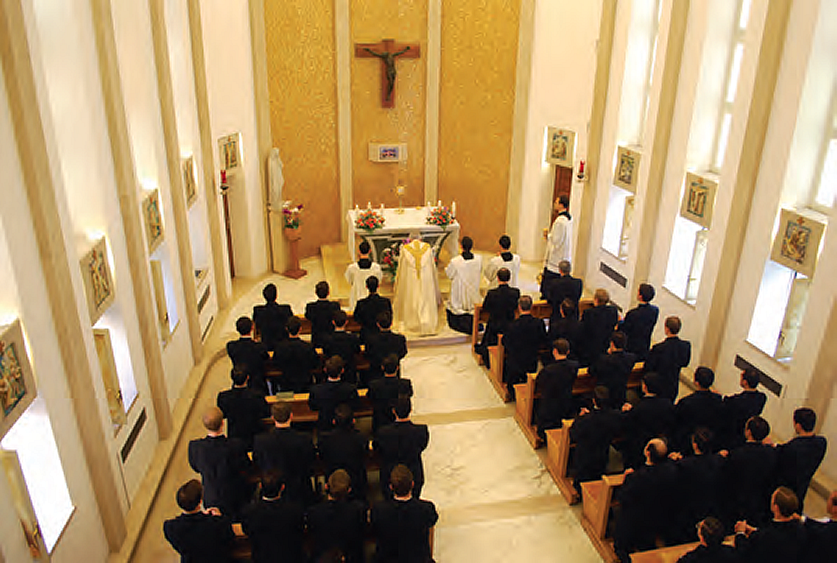
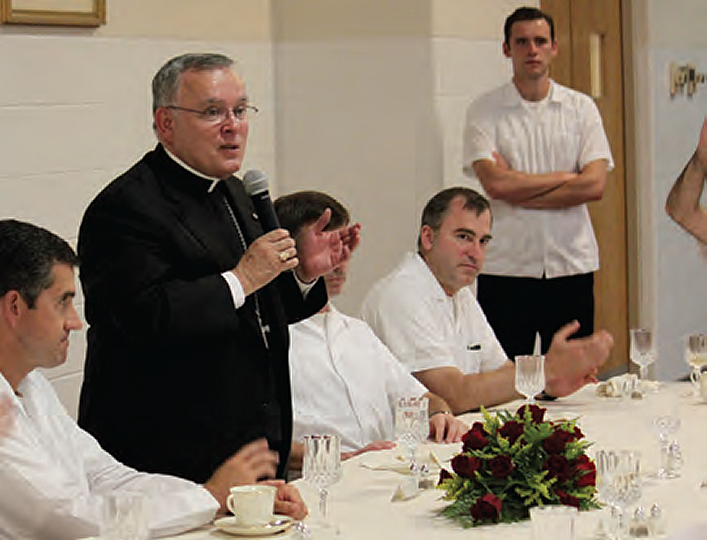
United States, February 3, 2009: A moment from a speech by Mons. Charles Joseph Chaput, OFMCap., to the Legionaries of Christ community in Cheshire after presiding over some diaconal ordinations.
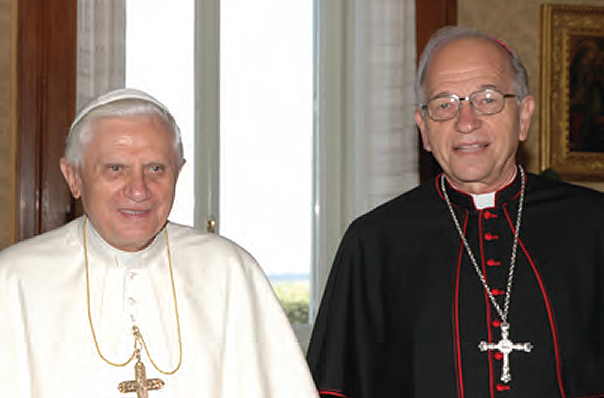
Vatican, September 10, 2005: Pope Benedict XVI with Mons. Ricardo Watty Urquidi, MSpS, then Bishop of Nuevo Laredo.
2009 – 2010
Apostolic Visit
With a letter dated March 10, 2009, Cardinal Secretary of State Tarcisio Bertone, SDB, announced to the Director General, Fr. Álvaro Corcuera, the upcoming Apostolic Visitation to the Legionaries of Christ “so that, through truth and hope, in a climate of fraternal and constructive dialogue,” the Congregation could receive concrete assistance from the Holy See to overcome the “existing difficulties” caused by the effects of the events related to Fr. Maciel.
The work of the team of five prelates formed for this purpose—Mons. Ricardo Blázquez Pérez, Archbishop of Valladolid; Mons. Charles Joseph Chaput, OFMCap., Archbishop of Denver; Mons. Ricardo Ezzati Andrello, SDB, Archbishop of Concepción (Chile); Mons. Giuseppe Versaldi, Bishop of Alessandria; and Mons. Ricardo Watty Urquidi, M.Sp.S., Bishop of Tepic—began on July 15, 2009, and concluded in the spring of 2010.
Thus, on May 1, 2010, a concluding statement was issued. It explained that “during the Visitation, personal interviews were held with more than a thousand Legionaries, and hundreds of written testimonies were examined. The visitors were in nearly all the religious houses and many of the apostolic works run by the Congregation. They heard, in person or in writing, the opinions of many diocesan bishops from the countries where the Congregation operates.”
Through the Apostolic Visitation, it was “possible to verify that the conduct of Fr. Marcial Maciel Degollado has caused serious consequences in the life and structure of the Legion, to the point that a profound review process is necessary.” This process was based on three fundamental points:
-
“The need to redefine the charism of the Congregation of the Legionaries of Christ, preserving the true core, that of the militia Christi, which characterizes the apostolic and missionary activity of the Church and is not identified with the pursuit of efficiency at any cost.”
-
“The need to review the exercise of authority, which must be united with truth, to respect conscience and be exercised in the light of the Gospel as authentic ecclesial service.”
-
“The need to preserve the enthusiasm of faith in the youth, the missionary zeal, and the apostolic dynamism through appropriate formation.”
Indeed, the disappointment caused by the founder could question their vocation and the core charism that belongs to the Legionaries of Christ and is specific to them.”
2010 – 2014
Period of the Pontifical Delegate
Considering the suggestions offered by the Apostolic Visit, on June 16, 2010, Pope Benedict XVI decided to continue accompanying the Legionaries of Christ. With the “desire to closely follow, support, and guide that path,” he appointed Mons. Velasio De Paolis as the Pontifical Delegate to govern the Congregation in his name for the necessary time and coordinate an Apostolic Visit to the lay movement Regnum Christi.
The ways of exercising this role, indicated by a decree from the Secretary of State in July 2010, provided that the superiors remain in office ad nutum Sanctae Sedis and must work in communion with the delegate, who, in turn, could count on the help of four counselors.
These counselors were: Mons. Brian Farrell, LC, Secretary of the Pontifical Council for Promoting Christian Unity; Fr. Gianfranco Ghirlanda, SJ, former rector of the Pontifical Gregorian University; Mons. Mario Marchesi, vicar general of the Diocese of Cremona; and Fr. Agostino Montan, CSI, director of the office for consecrated life in the Diocese of Rome and vice-dean of the Faculty of Theology at the Pontifical Lateran University. The Pontifical Delegate carried out the task entrusted by the pope for nearly three and a half years.
During this period – in which he was also appointed cardinal after the Consistory of November 20, 2010 – he sought to maintain regular contact with all Legionaries through letters, both informational and exhortatory. To address the most pressing issues, he created three commissions: the first for the revision of the Constitutions, the second for the study and review of the Congregation’s finances, and the third for addressing claims against the Legion related to Fr. Maciel’s behavior. At the beginning of his tenure, he made some reforms to the existing Constitutions due to concerns expressed by the Legionaries during the Apostolic Visit. Specifically, he abolished the role of the so-called “ordinary nuncios,” considering it unnecessary and a potential cause of confusion in the exercise of governance; issued new guidelines regarding the relationship between religious and their families, correspondence, email, and internet use; provided instructions on spiritual direction, the sacrament of penance, and the protection of conscience in dialogue with superiors, and on the distinction between internal and external forums.
In general, he adapted the functioning of the general council to the norms of common law and the specific law, guiding it toward the proper exercise of authority and participation. He also ensured greater representation of the entire Congregation within the general council and, together with the council members, carefully analyzed all matters related to religious life and administration and decided on a different practical organization for some houses of the Congregation.
In September 2011, he received from Mons. Ricardo Blázquez Pérez, Archbishop of Valladolid, the report on the Apostolic Visit to the consecrated members of Regnum Christi, carried out in the first half of that year, and also initiated, as a result of the Visit, a process of renewal within the Movement.
On May 27, 2013, Cardinal Velasio De Paolis had a private audience with the newly elected Pope Francis, to whom he presented a report. The pope confirmed him in his work to continue with the task he had been carrying out until the extraordinary General Chapter of the Legion. The work of the Pontifical Delegate, desired by the Holy See to safeguard the spirit, discipline, and perseverance of the Congregation’s members, concluded with the General Chapter of 2014, which led to the approval of the new Constitutions, the appointment of a new leadership, and a general acceptance of the calls for renewal, with positive consequences for the Congregation.
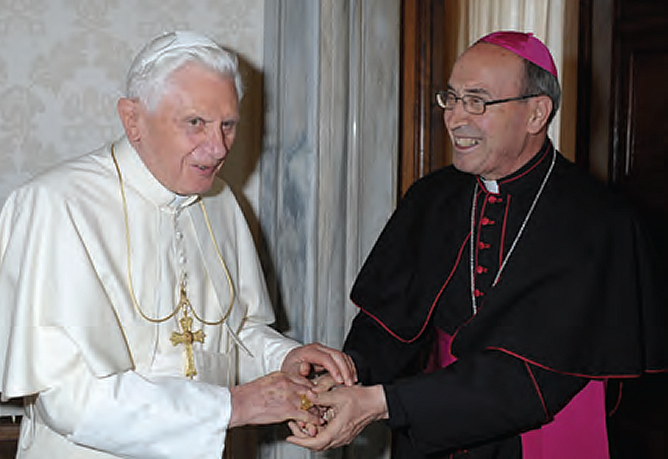
Vatican, June 19, 2010: Greeting between Pope Benedict XVI and the Pontifical Delegate, Velasio De Paolis, CS.
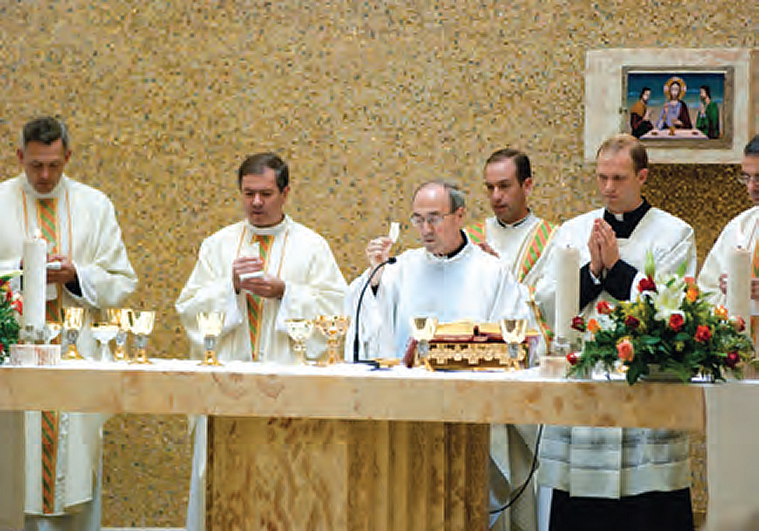
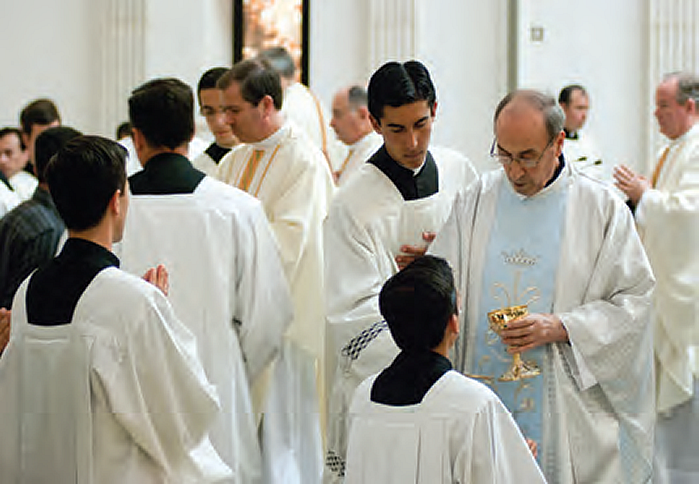
Rome, Higher Studies Center, July 10, 2010: Moment from the Mass celebrated on the occasion of the first meeting of the Pontifical Delegate, Velasio De Paolis, CS, with the Congregation.
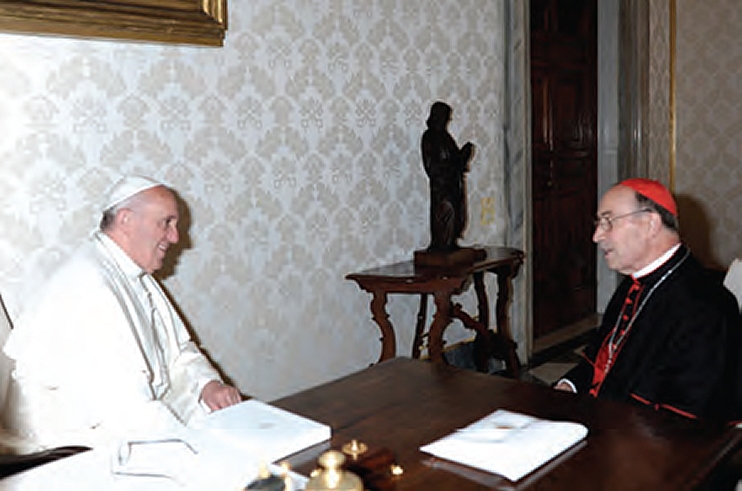
Vatican, May 27, 2013: Audience of Pope Francis with the Pontifical Delegate, Velasio De Paolis, CS.
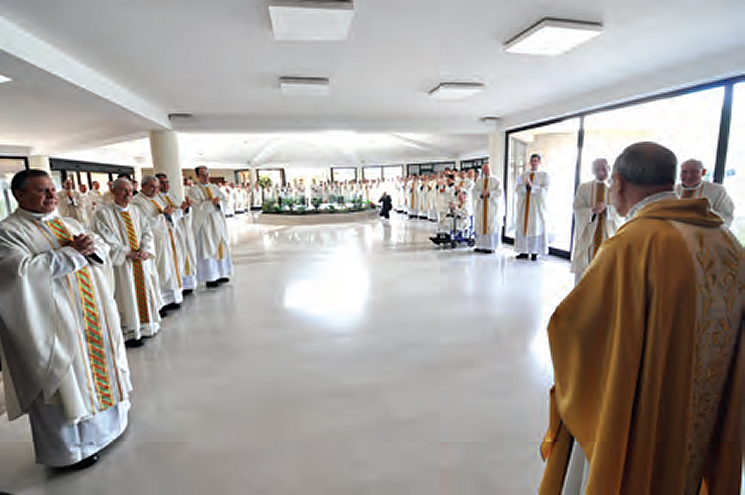
Rome, Pontifical College, February 25, 2014: The Pontifical Delegate, Velasio De Paolis, CS, greets the Director General, Fr. Eduardo Robles-Gil, LC, and the community of the Legionaries of Christ at the end of the concluding Mass of the Extraordinary General Chapter.
This section has been taken from the publication «Historia Institucional de la Congregación de los Legionarios de Cristo y del Movimiento Regnum Christi» (2015), prepared by the General Historical Archive of the Legion of Christ and Regnum Christi and published on the occasion of the 75th anniversary of the Congregation. Published in Spanish and Italian.
Texts: Salvatore Luciano Bonventre | Translations: Fr. Gonzalo Franco, LC | Selection of photographs: Salvatore Luciano Bonventre and Luigi Baldassarri | Coordination: Fr. Jaime Rodríguez, LC and Fr. Rodrigo Ramírez, LC
